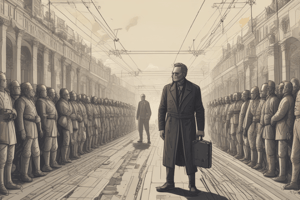Podcast
Questions and Answers
What has been the main contribution of March and Olsen's work to the study of political institutions?
What has been the main contribution of March and Olsen's work to the study of political institutions?
- Focusing on the behavior of political actors
- Reemphasizing the relative autonomy of political institutions (correct)
- Marginalizing political institutions as independent political forces
- Emphasizing the role of informal institutional norms and practices
How did the behavioral revolution in political science in the 1950s influence the study of political institutions?
How did the behavioral revolution in political science in the 1950s influence the study of political institutions?
- It emphasized the role of political institutions as independent forces
- It led to a focus on the behavior of political actors and formal institutions (correct)
- It marginalized the study of political institutions
- It led to a focus on informal institutional norms and practices
What is the primary role of institutions in ensuring accountability, according to the text?
What is the primary role of institutions in ensuring accountability, according to the text?
- Reflecting broader social and economic structures
- Shaping political outcomes
- Providing a framework for holding political actors accountable (correct)
- Exercising individual choice
How has the study of political institutions evolved over time, according to the text?
How has the study of political institutions evolved over time, according to the text?
What is the current understanding of political institutions in political science, according to the text?
What is the current understanding of political institutions in political science, according to the text?
Flashcards are hidden until you start studying
Study Notes
Political institutions are a critical component of political science, serving as the structural framework that shapes the behavior and interactions of political actors. This article aims to provide an overview of political institutions, their functions, and their role in political science.
What are Political Institutions?
Political institutions are the formal and informal structures that govern political processes, decision-making, and the distribution of power within a society. They include legislative bodies, executive branches, courts, political parties, and other organizations that play a part in the political system. Political institutions serve as the foundation upon which political systems are built, providing the rules and procedures that guide the interactions among political actors and the public.
Functions of Political Institutions
Political institutions serve several key functions within a political system:
-
Regulation of Power: Institutions help to regulate the distribution of power within a society, ensuring that no single group or individual can dominate the political process.
-
Making and Implementing Policy: Institutions facilitate the creation and implementation of policies that reflect the needs and wants of the population.
-
Resolving Conflicts: Institutions provide mechanisms for resolving conflicts and disputes within a society, helping to maintain social order and stability.
-
Ensuring Accountability: Institutions provide a framework for holding political actors accountable for their actions, ensuring that they are responsive to the needs and preferences of the public.
The Evolution of Political Institutions in Political Science
The study of political institutions in political science has undergone significant changes over time. In the past, political institutions were often viewed as reflections of broader social and economic structures, with little attention paid to their role as independent political forces. However, this perspective began to change in the 1950s, when the behavioral revolution in political science led to a focus on the behavior of political actors and a greater emphasis on formal institutions as arenas for political action.
In the decades that followed, political institutions were marginalized as independent political forces, with some scholars viewing them as mere reflections of underlying socioeconomic structures or as arenas for the exercise of individual choice. However, in the 1980s, March and Olsen argued for a reemphasis on the relative autonomy of political institutions, suggesting that they could have significant effects on political outcomes.
Since then, institutional political science has evolved to include a broader range of perspectives, with some scholars emphasizing the role of informal institutional norms and practices alongside formal rules. This more nuanced understanding of political institutions has helped to deepen our understanding of the complex ways in which institutions shape political processes and outcomes.
Conclusion
In conclusion, political institutions are a crucial component of political science, serving as the structural foundation for political systems and shaping the behavior and interactions of political actors. The study of political institutions has evolved over time, reflecting changing perspectives on their role and significance in politics. Today, political institutions are recognized as independent political forces that can have a profound impact on political processes and outcomes.
Studying That Suits You
Use AI to generate personalized quizzes and flashcards to suit your learning preferences.



